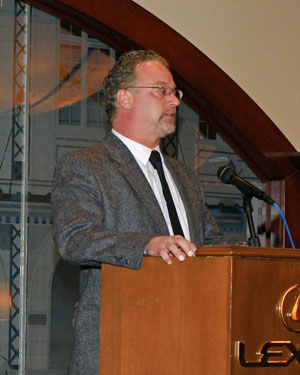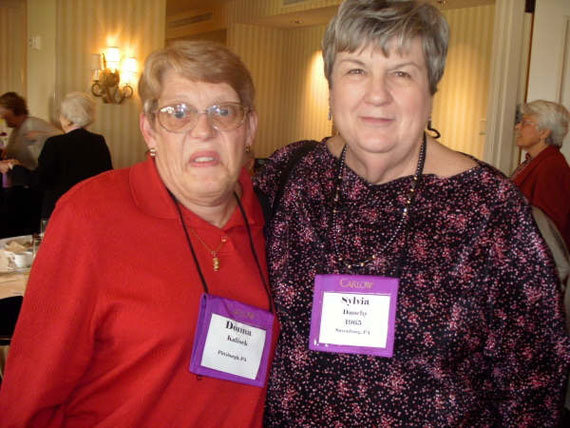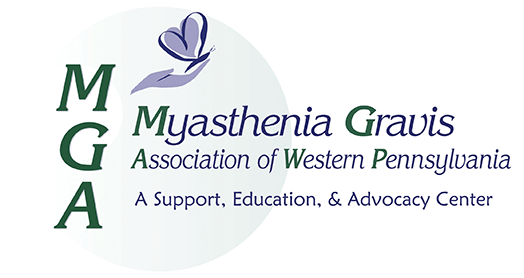Our MGA Community
Just recently, a young, beautiful new patient sat in the nurse’s office in tears. After she collected her emotions, she said gratefully, “After all of the searching, I have finally found a home.” That’s the way it is at the Myasthenia Gravis Association of Western Pennsylvania. We are individuals brought together to form a community of care and support for those whose lives have been touched by this chronic disorder. We extend an open invitation to people with myasthenia gravis and their family members. Additionally, this invitation extends to people who provide care to patients. This includes the medical professionals who see people with myasthenia gravis in their exam rooms, care facilities, and laboratories, and all others possessing a sincere interest in making the world a better place for people with myasthenia gravis. Please join us.
As this unique and diverse community comes together, there is no doubt that this association will continue to address the medical, social and emotional needs of all persons affected by myasthenia gravis and to disseminate educational information to persons with myasthenia gravis, their families, the medical community and the general public. Thank you for becoming a part of this amazing community. We need you.
Bessie Kalick
I have MG now for 61 years and the symptoms have most severe. I am now 87 years old and I still take medication. At the age of 26, I was helpless. It took me four years after being diagnosed to regain my strength. Back then, I took four pills per day. The doctor told me to do whatever was best for me. After some years past, I was taking 20 pills per day and was able to live a relatively normal life. I hope my story give others hope and encouragement.
Eric Lamison
Eric Lamison was invited to speak at the 15th Annual Sports Memorabilia Auction. We wanted to make sure that people know that every dollar they donate to support MGA impacts the lives of real people. Eric’s heartfelt message is so powerful; it is our pleasure to share it with you, too.

Eric Lamison’s Message:
My name is Eric Lamison and I’m here this evening to talk to you about Myasthenia Gravis and the Myasthenia Gravis Association of Western Pennsylvania.
I was diagnosed with Myasthenia Gravis in January of 2005 when I was 38 years old. At the time I was pretty active. I practiced martial arts two to three times a week and ran an average of about nine miles a week. After I was diagnosed, I continued to live pretty much the same life for the better part of a year. Then I started to notice that after a days work I couldn’t use my arms and legs well enough to exercise.
I was a Union Sheet metal worker and worked for a company doing heating, ventilation, and air conditioning work. I made it a little over two years working when I finally was no longer even able to lift the tools of the trade or even be able to make some of the long drives to work.
I continued going to a doctor for the MG, but I didn’t seem to be getting any better. My sister found out about the Myasthenia Gravis Association and I decided to give them a try. When I came to MGA, I found the staff to be friendly and knowledgeable. They started me on plasmapheresis treatments and I now can actually drive myself to the appointments. I was turned down for social security disability insurance, but thanks to Ginny Everard, the Treatment Center Coordinator, I am now receiving disability compensation.
My goal is to get back to work and with the help from the MGA I feel it is possible. It is nice to know that the neurologists and staff specialize in MG, so you can get the best and latest treatments available.
Now, I won’t bore you anymore. But, I would like to thank everyone for coming tonight and let you know that the funds from events like this help keep the MGA running and making a difference in people’s lives all across Western Pennsylvania, including mine.
Donna Kalisek
Pittsburgh has the oldest and second largest St. Patrick’s Day Parade in the country. MGA received an invitation to nominate a candidate to ride in the parade. The St. Brigid’s Court Committee was looking for a woman who exemplifies the qualities of St. Brigid, including courage and grand will in the face of adversity, and someone who demonstrates spiritual strength. MGA staff didn’t have to think very hard about who to nominate.
In 1966, Donna Kalisek was afflicted with a neuromuscular disease characterized by muscle and nerve weakness of the voluntary muscles of the body. Donna was eight years old at the time. With no cure for Myasthenia Gravis (MG), Donna realized that she would never ride a bike; she would have difficulty keeping her eyelids open and often be hospitalized with respiratory difficulties. She eventually became a fourth grade ‘drop–out’ because administrators felt that the school was not equipped to accommodate her needs.
But Donna fought back with hope, faith and humility. She was always among the first to submit herself to experimental treatments to relieve some of the symptoms of MG. Donna’s personal sacrifice and a courageous spirit is an inspiration to others who are afflicted with MG. Consequently, Donna’s example also touches the families of people with MG and the greater community who provide for needs of people with this life changing illness.
Donna’s self-esteem has flourished since the days that passed her by, due to her illness, in her youth. The school began a more inclusive program when Donna was 13. Although her peers often treated her differently, and she continued to miss school days due to the symptoms of MG, Donna now proudly proclaims, “I’m myself. I don’t care anymore what other people think. I used to be jealous that they could do more than I. Then I learned I could do things they can’t. If other’s can’t accept me, that is inside of them. That’s not me.”

Additionally, Donna reinforced her worth as an invaluable asset to the Myasthenia Gravis Association of Western Pennsylvania (MGA of WPA) when she relinquished her volunteer role with the organization in lieu of a paid staff position. Donna is now the Administrative Coordinator for MGA of WPA and her contribution is essential to its day-to-day operations.
Again, with confidence, Donna says, “I now live in my own apartment and enjoy the independence and responsibility that go along with it. And yes, I am still making adjustments in my life. Having a positive attitude, a strong support system, and an active will to live life to the fullest have kept me going.” With cape, tiara, green tipped white roses and a sash, with the “Spirit of the Fighting Irish”, Donna made Saint Brigid proud!
MGA Helps Patient Regain Freedom and Independence
MGA strives to educate, advocate, and support, anyone who has been affected by myasthenia gravis, a chronic neuromuscular disorder. Patients, family members, friends, and co-workers are welcome to inquire if assistance is needed, regardless of whether the needs are medical, social, emotional, or physical. MGA staff and volunteers had the opportunity to serve a patient with MG in the community recently. I’m proud to share this story.
One of our young patients qualified to receive an electric wheel chair to improve her mobility. The wheel chair was delivered to her residence. However, she was still homebound. She needed a wheelchair ramp to be able to get in and out of her home, and to help build and regain her independence and self-confidence. She didn’t have the financial means or the connections to undertake this project. Through diligence, perseverance, and the commitment to our patient population, MGA staff and volunteers did what we could to help.
Upon diligent searching, a generous local business provided the needed materials at a reduced cost. MGA staff sought assistance from local carpentry unions and similar providers. We were unable to find a skilled person to build the ramp. It took only a few words spoken in passing to a knowledgeable family member of mine and he generously donated his time and talents to help with this project. A couple of hours on a sunny afternoon and the ramp was expertly completed. This patient now has her much needed independence to continue on with her life.
As a community we all need to reach out to help each other. We need to share compassion and support each other. As a person with MG, I know how difficult life can be and what kind of obstacles there are out there in the world. We need to educate the public, we need to educate the medical community, but most importantly, we need to educate and support each other. Don’t be afraid to ask for help. Even if all you need is a little carpentry work. MGA will do what we can to help.


